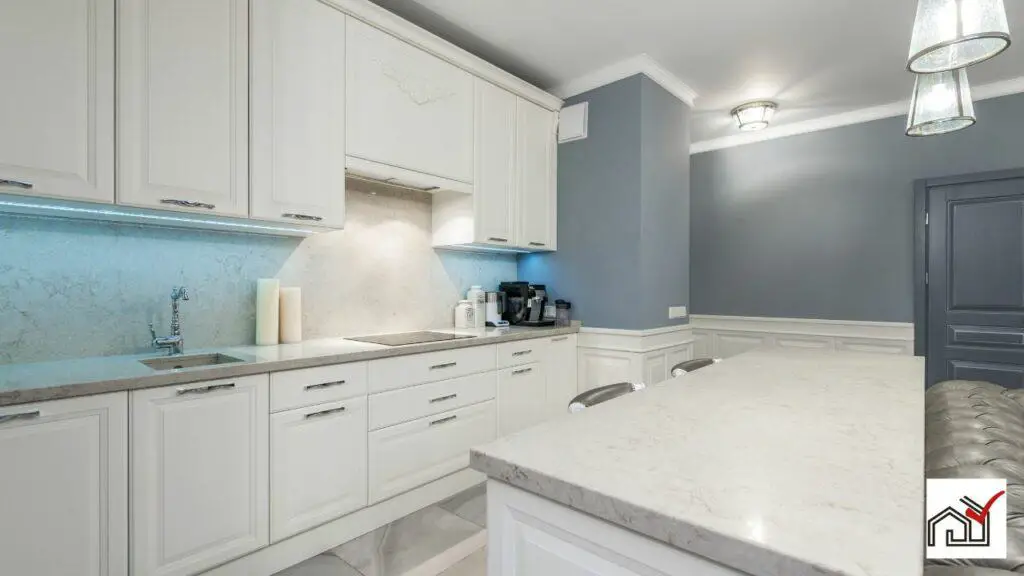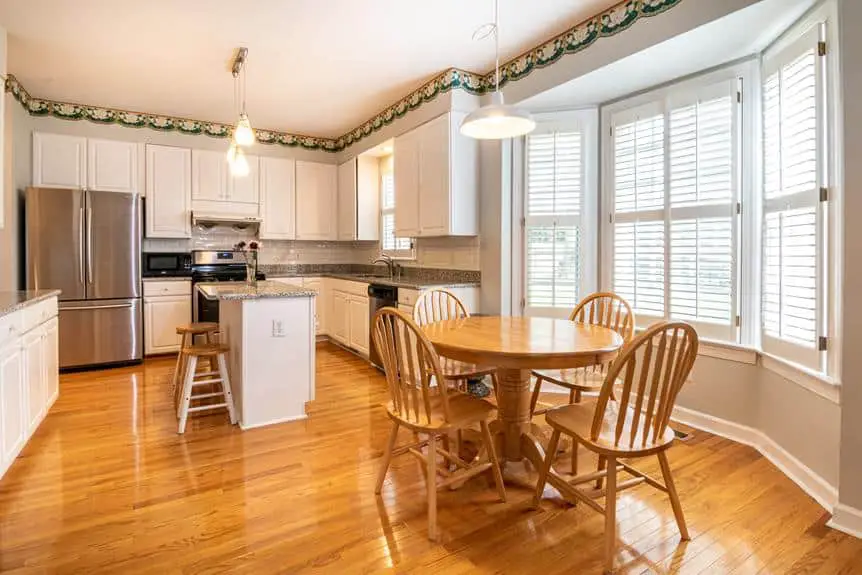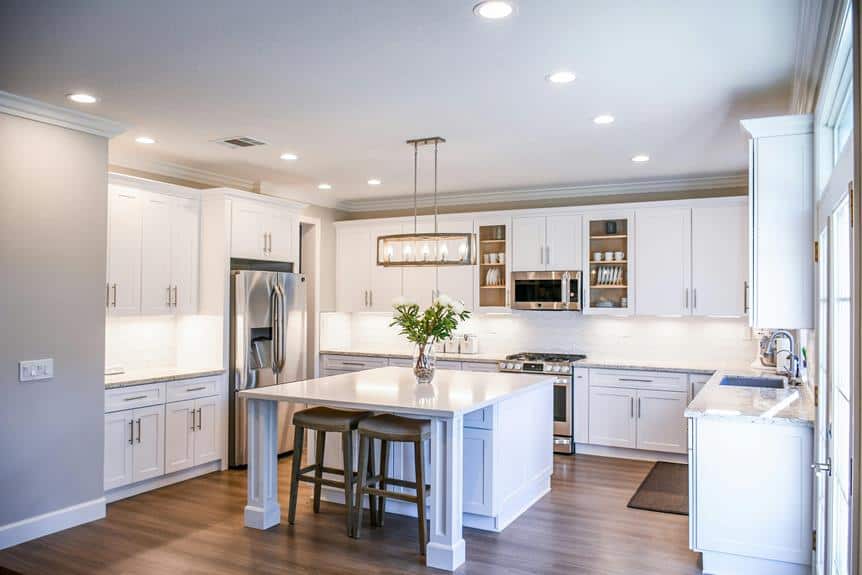Granite countertops can develop pitting, which are small holes or indentations. This condition can occur due to the natural properties of granite, particularly in types with certain mineral compositions and larger crystals.
Pits may also form during the polishing process used to smooth the stone. Regular use and abrasive cleaners can worsen pitting.
Awareness of these causes is important for proper care and maintenance of granite countertops.
Understanding Granite Pitting
Granite countertops naturally have small pits due to their crystalline structure. These pits, which are spaces between minerals like quartz and feldspar, become more apparent after the stone is polished. Pits are not defects; they are part of granite's natural texture.
Pitting does not compromise a countertop's strength or function, but can collect debris if not sealed. Filling pits with epoxy can smooth the surface and prevent debris accumulation.
Regular cleaning, immediate spill cleanup, and periodic resealing are essential for maintaining granite countertops. For significant pitting issues, it's advisable to seek help from professional stone care experts who can treat and maintain the granite properly.
Natural Characteristics of Granite
Granite possesses natural characteristics like a varied mineral composition, which leads to the development of pits, or small depressions, over time. These pits are the result of granite's formation process and are not considered defects. Granite, formed from magma that cools slowly deep within the earth, contains minerals such as quartz, feldspar, and mica, which give it its appearance and strength.
The uneven distribution of minerals can create less dense areas, where pits may form. These features are part of the stone's unique look. Each piece of granite is distinct, with its own pattern and texture.
When granite is extracted and cut into slabs for countertops, pits may become more noticeable after the stone is polished. These pits typically do not affect the granite's durability or function. If a completely smooth surface is desired, professionals can fill the pits with a matching epoxy.
To maintain granite countertops and prevent excessive pitting, it is important to clean, seal, and maintain them properly. These steps will help preserve the countertops' appearance and longevity.
Impact of Daily Usage
Daily use of granite countertops can lead to wear and tear. Activities such as chopping and placing heavy objects can worsen the small pits that are naturally present in the stone. Over time, kitchen tools and appliances can increase the appearance of these pits.
Acidic substances like lemon juice, vinegar, and tomato sauce can damage the sealant on granite and the stone itself if not cleaned promptly. These substances can make the material weaker and increase pitting.
Proper cleaning is essential for maintaining granite countertops. Using abrasive sponges or harsh chemicals can remove the sealant and scratch the surface, making it more prone to pitting. Spills should be cleaned immediately to avoid damage.
To reduce damage from daily use, it is important to clean granite countertops correctly and use products made for granite. Regular checks for pitting and resealing the granite when necessary can help maintain its condition and appearance.
Effects of Cleaning Practices
Cleaning methods affect the condition of granite countertops. Using the wrong practices can lead to pitting, which are small holes on the surface. Granite is a durable material, but it needs proper care to last. It's important to clean regularly with the right products to maintain both appearance and structure.
Avoid acidic cleaners as they can react with granite and cause surface damage. Instead, use non-abrasive, pH-neutral cleaners made for natural stone. Using harsh chemicals or abrasive tools can create small damages that turn into pitting.
To clean granite countertops, use warm water with a suitable cleaner. Warm water can remove light residues without damaging the sealant or causing pitting. Clean spills quickly, especially acidic ones, and use granite-safe products to clean the area.
If pitting occurs, fill and seal the pits to stop dirt from getting trapped and causing more damage. Proper cleaning helps keep granite countertops in good condition for a long time.
Prevention and Maintenance Tips
To prevent pitting in granite countertops, it is important to maintain them properly. Clean the surface daily with a pH-neutral cleaner or a gentle soap and warm water solution to remove harmful substances. Do not use acidic or abrasive cleaners as they can damage the granite.
Immediately clean up any spills, especially acidic substances like lemon juice, vinegar, or wine, to prevent damage to the sealant and the stone itself.
Check the sealant regularly by sprinkling water on the granite. If the water beads, the seal is good; if it soaks in, the countertop needs resealing. A proper seal helps prevent pitting by protecting against damaging substances.
If pitting occurs, it is important to address it quickly. Hire a professional stone care service to clean, seal, and fill any pittings with appropriate materials and methods, which will help maintain the countertop's condition over time.
Professional Repair Options
Professional repair services are necessary for repairing pitting in granite countertops to ensure the use of proper materials and techniques. These services can effectively restore the appearance and durability of granite surfaces. Technicians, such as those from The Marble Clinic, can fill pits with a custom-matched epoxy.
Choosing a professional is crucial as attempting repairs without the requisite knowledge can lead to further damage. Stone care experts have the necessary experience and tools to select the right epoxy, ensuring the repair blends in with the rest of the countertop.
The repair process usually includes careful polishing to match the rest of the countertop and to bring back the stone's shine. This step must be done with precision to prevent additional scratches or damage.
Using professional repair services ensures the job is done correctly the first time, avoiding additional stone damage and saving on future repair costs. With professional help, granite countertops can be restored to their original condition, preserving their beauty and usefulness.
Home Repair Solutions
Home repair options exist for small pits in granite countertops, providing a DIY alternative to professional services. Homeowners can repair minor pits or rough areas on their countertops by following specific steps.
Clear epoxy or resin can be used to fill pits in granite. The process involves cleaning the area to remove debris, applying epoxy to the pit until it's level with the countertop, and allowing it to cure as per instructions.
For those who prefer a simpler solution, granite repair kits are available with all the necessary materials and instructions, including colorants to match the countertop's color and pattern.
Home repairs are suitable for minor pitting, but not for larger problems. For serious issues, it's best to consult a professional to ensure the granite's durability and appearance.
Regular maintenance, such as cleaning, dealing with spills quickly, and resealing the surface, can prevent further pitting and maintain the countertop's condition. Early intervention and proper care help keep granite countertops looking good.





